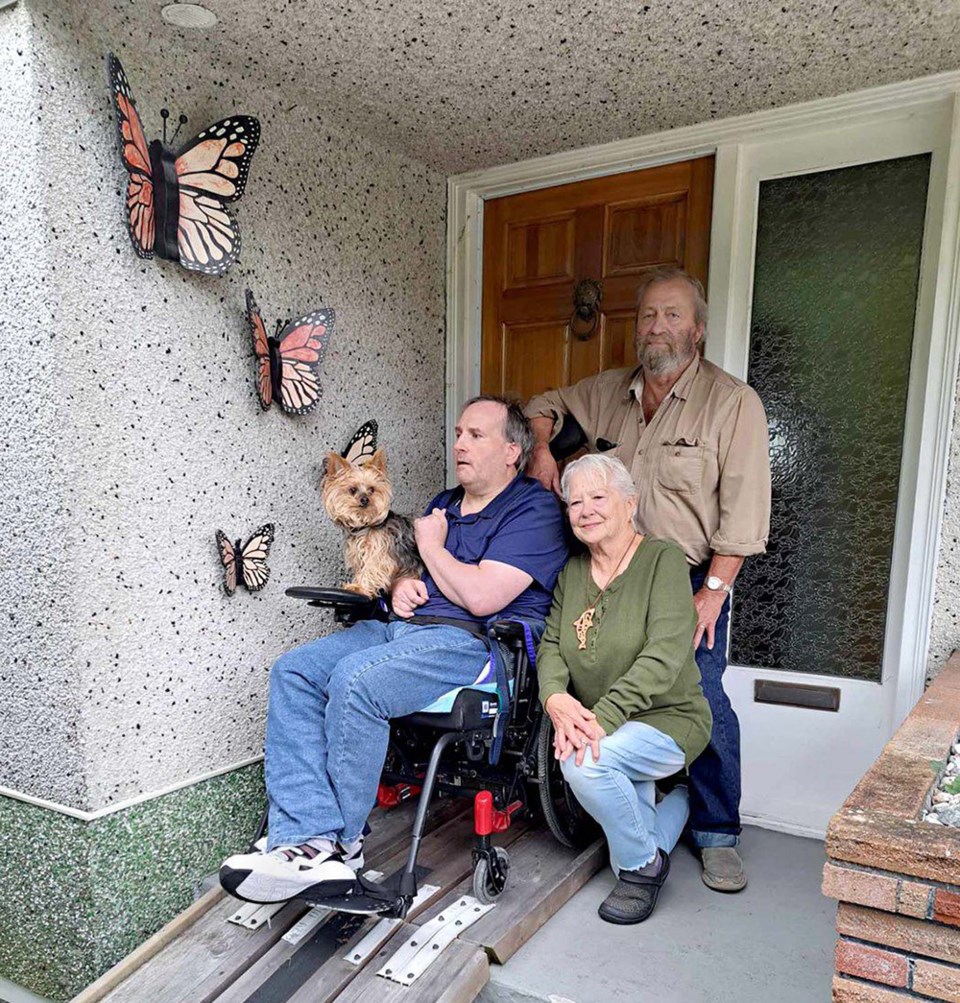The Hodgins family was still smiling from their visit to the Salmon Expo on the afternoon of October 21. It was a great morning out for Mike, Marg and Dave, because the hatchery is one of the only truly accessible amenities in the qathet region. Apart from getting splashed with a fish and having to wait to use the viewing platform Dave built – as there were so many children on it, which he was thrilled to see, as everyone wins when things are made more accessible – it was an easy outing.
Parents Dave and Marg admit that they had just assumed this was an accessible region. Mike, who has a congenital tumor disease, could walk normally until he had a third stoke five years ago. Previously, he worked at Rocky Mountain Bakery, and then in housing maintenance. Now, he lives at Willingdon Creek, and visits his parents weekly in Westview.
“He told us he didn’t want to go anywhere but the house,” Dave, who is retired from the mill and the vice-chair of the new regional Accessibility Committee.
Marg, a retired registered nurse, offered to take him to the mall, because he likes Dollarama and Dairy Queen. But even these favourites have become tough to navigate. The doors at DQ require a complicated dance to enter; Dollarama’s maze-like line-up area prevents his buying things. The family has also watched other wheelchair users, stroller-users and elders with mobility challenges struggle in the same ways, even in places that are theoretically built for accessibility.
Sometimes their advocacy results in change, said Dave. For example, most people with vans capable of carrying a wheelchair load out the back, as the adaptation is far cheaper (still $10,000), but the nine wheelchair parking spots on Marine Avenue were designed for side-loaders.
The family lobbied City of Powell River Council for a change. Then-city CAO Russell Brewer sat down with them to understand, and 10 months later, seven of the nine are truly accessible. Similarly, when the couple complained about accessibility to qathet Regional District (qRD), things changed.
“I think they got tired of us calling. So [qRD operations manager] Patrick Deveraux called us back and said, ‘what would make you happy?’ We said, ‘People with disabilities don’t have to be able to go everywhere, just some places.’”
They chose the gazebo at Haywire Bay as a goal, and Patrick met the family there. Patrick tried to push Mike in his chair from the parking lot to the gazebo, over gravel, and couldn’t do it. So, qRD added a hard trail from the parking lot, and a lip to the gazebo – then he invited the family out again. It worked.
“Then he called us about Shelter Point and Palm Beach,” said Marg. “Because Patrick took the time to really understand what the problems are, he became much more conscious himself.”
It’s those kinds of transformative moments that the Hodgins are hoping to instil. Because they’ve had such a revelation over the past five years, they’re hoping to share that widely. Sometimes it’s embraced, sometimes it isn’t.
Accessibility challenge
For example, just before COVID-19, the family came to a city committee of the whole meeting and challenged the councillors to try a day in a wheelchair. None of them took them up on it, they recall.
“Our hope was that if someone would try living their life in a wheelchair for even half an hour, it would open their eyes that even things that are theoretically accessible often really are not.”
Many doors in public spaces have a button to open them automatically, said Marg. But they almost always open toward the person pushing the button. If you’re in a wheelchair, she said, you have to be able to push the button, back up quickly (ensuring no one is standing behind you) and then zip through the door.
Most banks are built for accessibility, they explained, but do not have a teller at wheelchair height. The Zunga Bus is supposed to be accessible, but the drivers still aren’t trained on how to make that happen in real life, the Hodgins said. An accessible taxi was donated years ago, but it’s not on the road, they shared.
HandyDART, the BC Transit service that specializes in moving people with wheelchairs and other mobility challenges, is great, but so heavily used that customers have to book it at least a week in advance – and it stops running before dinnertime. Even the region’s big free festivals – a symbol for social inclusion – can be a struggle for people in wheelchairs, the Hodgins explained.
“Quite a few people say ‘Why do you bother?’ I tell them, ‘Mike is busy just surviving. We have to speak for him. Also, we’re not getting any younger,”
Marg added, “Hopefully, if we keep working at this, new people will pick up the advocacy. This is an older community and mobility challenges impact lots of people. Hopefully with lobbying, things will change.”
The Joint Accessibility and Inclusion Advisory Committee assists City of Powell River, Powell River Public Library and qathet Regional District to identify, remove and prevent barriers experienced by persons with disabilities per the legislated requirements for prescribed organizations under the Accessible British Columbia Act and Regulation.
To send feedback, go to qathet.ca/about/accessibility. The committee’s next meeting is December 7, 9 am, at qRD office on Marine Avenue.
Join the Peak's email list for the top headlines right in your inbox Monday to Friday.


